[ad_1]
Nikos Papanikolaou
BBC News
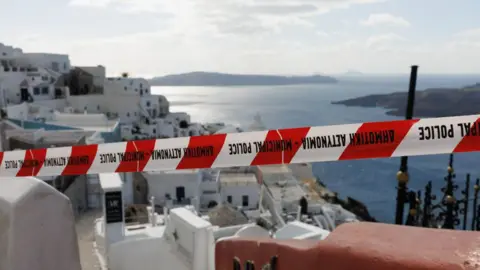 Getty Images
Getty Images
On a peaceful summer season day on Santorini in July 1956, catastrophe hit.
“I remember our dog and bird acting strangely. Then, the earthquake struck,” 83-year-old Eirini Mindrinou recollects. “The house split open before closing again. Through the crack in the roof, I could see the sky.”
The 7.8-magnitude earthquake, which hit between Santorini and the close by island of Amorgos, destroyed a lot of the island, and a strong aftershock 12 minutes later brought about additional injury. Fifty-three folks died.
The island, then only a quiet fishing village, was scarred and its folks fled.
It is way completely different immediately, rebuilt into considered one of Greece’s most coveted vacationers locations ‚Äď however this week, one other mass exodus unfolded as a brand new wave of earthquakes hit the island.
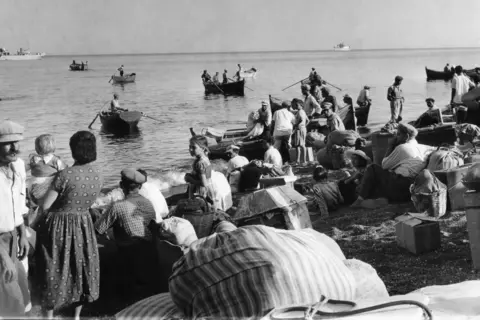 AP
AP
After an earthquake hit Santorini in 1956, residents took to the ocean to row to security
Subtle tremors that had begun in June 2024 was full-fledged quakes, shaking houses and unsettling the island’s residents. Families rushed to depart by air and sea, desperately in search of respite as the bottom shook as soon as once more.
But not everyone seems to be fleeing. Those that stay show the combination of braveness, necessity, and a deep connection to the land that has come to outline the locals of this island. They endure sleepless nights, haunted by reminiscences of the previous and the terrifying unknown of what is but to return.
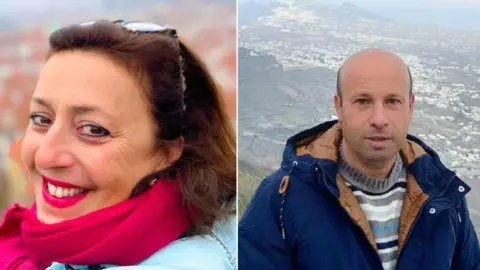 Margarita Karamolegkou and Matthaios Fytros
Margarita Karamolegkou and Matthaios Fytros
Margarita Karamolegkou and Matthaios Fytros are among the many individuals who have not left Santorini
“The noise from the earthquake… it’s unbearable. Even in my house, it’s become overwhelming,” says Margarita Karamolegkou, a neighborhood businesswoman. “I’ve felt tired, day after day, with no end in sight‚Ķ But I haven’t felt fear. I can’t leave my home, and I can’t leave the people who’ve stayed behind.”
This resilience is nothing new. People have have withstood each social change -about 3.4 million visited the island final yr, in line with Mayor Nikos Zorzos – and seismic shifts. Now, as at all times, they’ve come collectively in solidarity.
“We’re doing our best to support the vulnerable,” says Matthaios Fytros, a neighborhood volunteer and service provider. “People with disabilities, the elderly – many struggle to get around, and their homes are hard to reach. If a major earthquake hits, I know exactly where they live, and I’ll get to them as fast as I can, alongside the firefighters.”
Matthaios and others patrol the island, guaranteeing deserted properties aren’t looted and serving to anybody in want. “I’m not afraid,” he says with quiet conviction. “We’re proud of our island. I just hope everything works out and that this ordeal ends soon. We’ll be happy to have our visitors back with us.”
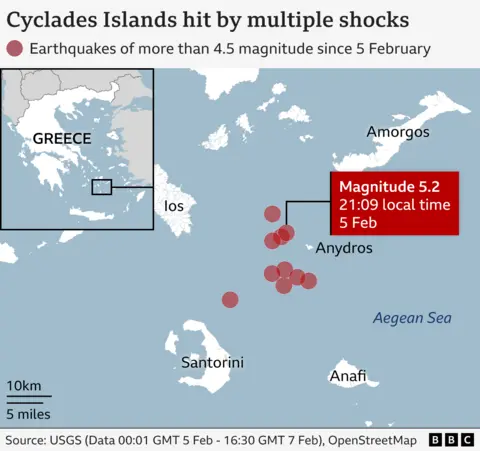
The response of the state has been swift, with measures taken to handle the disaster. Beneath the gratitude for the federal government’s intervention, nonetheless, lingers a quiet bitterness. Many islanders recall the years when their cries for higher infrastructure and help went unheard.
“For years, we’ve been asking for a better port, something to help us manage the growing number of tourists,” Margarita says, her voice tinged with frustration. “We need help preserving the island’s identity – its unique environment, the seismic and volcanic forces that shape it. We’re grateful for the tourists, but we also need to protect what makes Santorini special.”
Tourism has grow to be the lifeblood of Santorini’s economic system. The island contributes round 2.5% to Greece’s GDP, roughly 5.9 billion euros (¬£4.9 billion) annually.
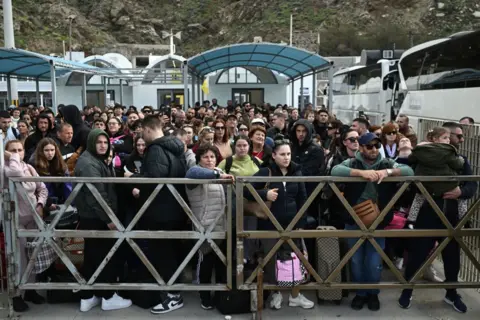 Getty Images
Getty Images
Lots of individuals fled from Santorini – however not everybody
As the tremors proceed, the way forward for Santorini’s economic system stays unsure. Will its prosperity stand up to the shaking floor? The folks of Santorini fear that the island’s fragility could quickly prolong past the land itself.
“I regret how haphazard the island’s development has been with the rise in tourism,” says Eirini, who’s briefly in Athens, not out of worry, however for routine medical exams. “We’ve damaged the natural environment here. Now, with the earthquakes continuing, there’s a real risk we could lose the entire tourist season.”
Scientists could not know when the shaking will cease, however as a substitute of succumbing to worry, some residents have chosen to know the phenomenon, hoping that can carry them reassurance within the face of the unknown.
“I try to think of what’s happening with kindness,” Margarita says thoughtfully. “It feels like something is settling down there. Everything we admire about Santorini today – the beauty, the character – has been shaped by the volcano and its seismic forces.”
“We are the most beloved island,” says Matthaios, his voice stuffed with pleasure. “And I believe we’re the most beautiful of all the islands in Greece. We will get out of this stronger.”
[ad_2]



